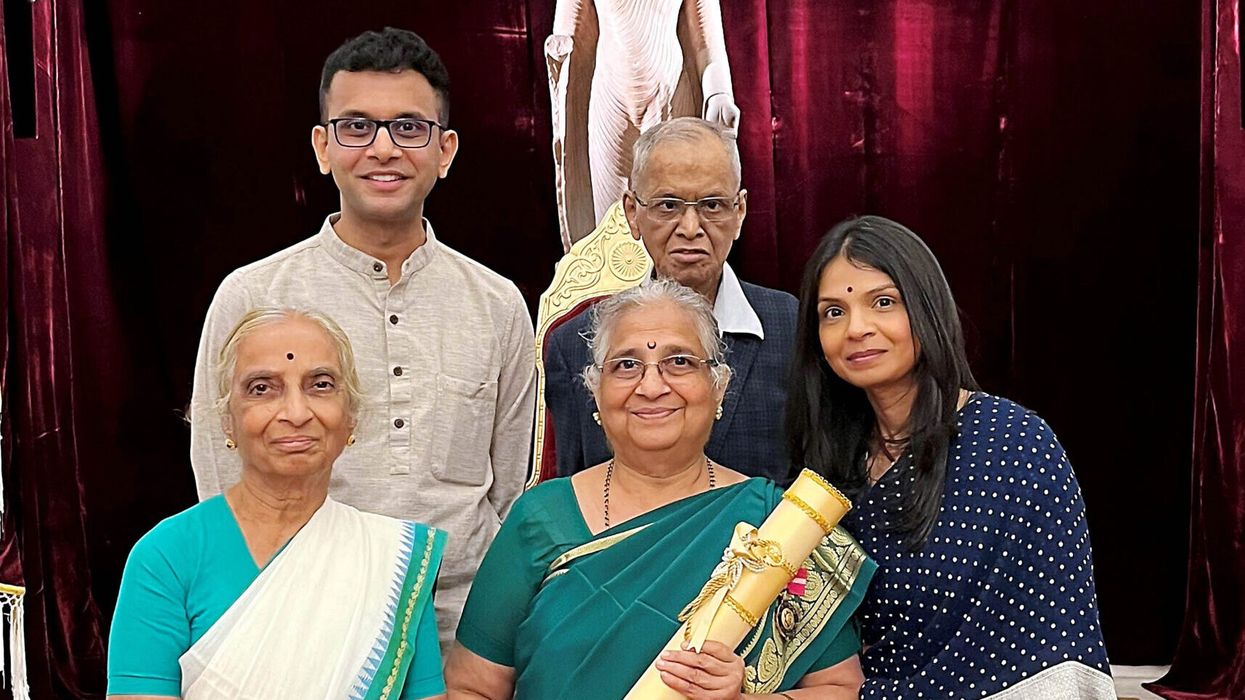INFOSYS co-founder NR Narayana Murthy was not in favour of his wife Sudha joining the company because he did not want the then start-up to be perceived as nepotistic, a new book has claimed.
Murthy, whose daughter Akshata is married to prime minister Rishi Sunak, set up the company along with six others in 1981. He went on to serve as chief executive officer and chairman until he stepped down from the board in 2011.
Now 77, he is a billionaire, while his wife is known for her philanthropic work through the Infosys Foundation.
Indian American author Chitra Banerjee Divakaruni’s biography, titled An Uncommon Love: The Early Life of Sudha and Narayana Murthy, tells the story of the couple’s early years, from their courtship to Infosys’ founding years, and from their marriage to parenthood.
Although she was an engineer, Murthy was averse to Sudha joining Infosys. He knew she could contribute far more solidly to the company than helping with the odds and ends he assigned to her, the book said.
When Sudha proposed the idea to him one evening at dinner, Murthy refused: “I’m sorry. You can’t work at Infosys.”
His reasoning was: “The two of us cannot be in the same company.”
He did not want Infosys to suffer the same fate as other family-owned businesses or be seen as “dynastic or nepotistic”.
Murthy told his wife she was extremely well qualified and praised her determination, but insisted if she joined “Infosys (it) will become a husband-and-wife firm, rather than a professional company”.
While Sudha and Murthy had many things in common because of their shared background – they both came from the south Indian state of Karnataka – and their love for reading, their different childhoods shaped them in unique ways, the author said.
Murthy was a staunch socialist who had been influenced as a teenager by his father’s ideas as well as India’s first prime minister Jawaharlal Nehru’s admiration of the Soviet Union, officially the Union of Soviet Socialist Republics (USSR).
He once told Sudha: “Russian is the language of the future. That’s why I’ve been studying Russian and collecting Russian books for the last two years.”
Sudha countered, “I’m positive that English is going to remain the language of the world. That’s why I make it a point to read as many English books as I can, even though I went to a Kannada-medium school and enjoy reading Kannada more.”
“Murthy stubbornly held on to his Russian books even after he changed his life philosophy to compassionate capitalism. After their marriage, it would take Sudha many years of cajoling before he would allow her to dispose of them,” according to the author.
Another anecdote illustrates the struggles of the young entrepreneur during the early years of setting up Infosys.
Murthy travelled to the US to meet a “temperamental” client who made him sleep on a large box in a windowless storeroom, surrounded by cartons, though the American businessman’s own home had four bedrooms.
Donn Liles, who headed the New Yorkbased company Data Basics Corporation, was especially unpleasant to Murthy at times, the book said.
“He would often delay payments when he could, and Murthy would then be the target of his ire because he would hold his ground, refusing to budge on timely payment for services. Or Donn would not provide timely authorization for Murthy and his Infosys colleagues to book hotels when they had to visit him in Manhattan.
“Once when Murthy visited the US for client work, Donn made him sleep on a large box in the storeroom, surrounded by cartons, though his home had four bedrooms. Additionally, Murthy had to manage Donn’s many last-minute demands for resources,” the book said.
Murthy endured Donn’s behaviour for the sake of his fledgling company, but the incident made him and Sudha angry.
“My mother used to say a guest was like God, and the way you treated your guests revealed what kind of person you really were,” he told his wife.
“When my father invited someone over without advance notice, she often served the guest her own food and went to sleep without dinner. And here was Donn enjoying a good night’s sleep in his luxurious bed after making me spend the night on a big box in a windowless storeroom,” he said.
Divakaruni said capturing in words the lives of “two extraordinary people from ordinary backgrounds, who changed the face of entrepreneurship and of philanthropy in India” was challenging.
“At its heart, this is a love story, an un[1]common one. It chronicles not only Sudha and Murthy’s love for each other, but also their love for their values and for their country – and their determination to use the former to transform the latter. It shows us that human love – no matter what the romantic movies profess – is fraught with failures as well as successes, sadness as well as joy,” she added.




